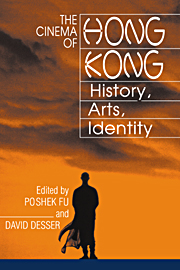Introduction
Published online by Cambridge University Press: 05 June 2012
Summary
Since its inception in the 1900s, the cinema of Hong Kong has been a significant part of Chinese film, which encompasses a multiplicity of cinematic sites and traditions. This connection was marked as much by artistic and financial interactions as by business rivalries. Movie producers, directors, actors, and technicians constantly traveled between Hong Kong and Shanghai, then the “Hollywood of the East,” to make films. For example, the giant Lianhua (United China) Productions, cofounded in Shanghai in 1931 by Luo Mingyou and Hong Kong filmmaker Li Minwei, and financed by such Hong Kong business tycoons as Sir Robert Ho Tung, had production studios and distribution offices in both cities. Tianyi (First) Film Company, on the other hand, moved its production arm to the colony in 1932 in the wake of the Japanese attack on Shanghai. After the outbreak of World War II in China in 1937, the whole company relocated to Hong Kong under the name of Nanyang (South Sea) Studio, which was to develop into the Asian media empire of the Shaw Brothers Studio.
At the same time, reflecting the city's position as a British colony situated at the periphery of the mainland, Hong Kong cinema is rooted in its local cultural tradition. Contrary to the stereotype that equates Hong Kong films to “making for money,” the industry has a complex history of contestation among various political and ideological–linguistic positions and aesthetic orientations.
- Type
- Chapter
- Information
- The Cinema of Hong KongHistory, Arts, Identity, pp. 1 - 12Publisher: Cambridge University PressPrint publication year: 2000



